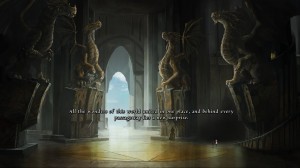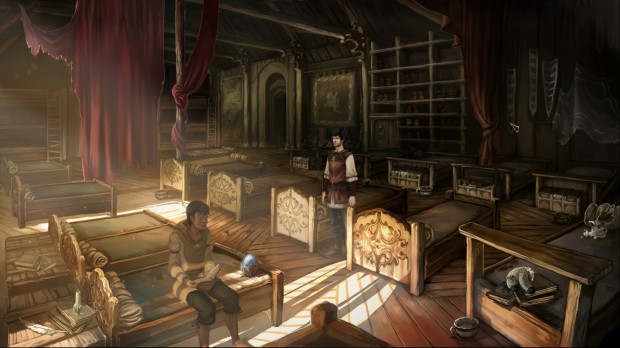Memoria Review (PC)
- Updated: 12th Sep, 2013

Memoria is a gorgeous point-and-click adventure. I love it. Set in the fantasy role-playing universe of The Dark Eye (no, I hadn’t heard of that either but it’s apparently very popular elsewhere in Europe), it’s the sequel to Chains of Satinav, but you don’t really need to have played Satinav to follow this game. There’ll be the occasional unexplained whinge from your main character Geron about how the citizens of Andergast treated him badly but you can just ignore him. He’ll get over it.
Rather than repeating myself to explain the world of Memoria, you may as well just go and read my preview from last month and come back. In it, I pointed out that one of the riddles hadn’t been fully translated. This has, indeed, been fixed for the full release, though I’m still not entirely confident in the solution. I won’t spoil it for you but just to explain the issue:
At one point, you need to match up 6 stone faces with 6 riddles. Once you know the solution, the matches make sense. However, when you don’t know the “correct” solution, some of the riddles could apply equally to a few of the faces. It’s annoying, but it’s the only real issue I had with the game. For the most part, the puzzles and their solutions are signposted very well, yet you still feel clever working them out.
 You’ll rarely resort to the old chestnut of combining every inventory item with every other one and each character has a few magical powers that give puzzles an interesting twist.
You’ll rarely resort to the old chestnut of combining every inventory item with every other one and each character has a few magical powers that give puzzles an interesting twist.
Geron can break and reassemble small items at will, which is put to good use in a number of places while not quite being powerful enough to break the narrative. Sadja, on the other hand, lives in a much more magical time and you’ll adapt your approach to this very quickly.
The two lead characters are good company for the 10 or so hours that you’ll be together, even though the game’s tone is more friendly than jocular. Sadja is a no-nonsense princess who makes the occasional sarcastic joke at the expense of her travelling companion, while Geron just wants to help his fairy companion who is currently trapped in the form of a bird.
I did run into the rare line where the game called up the original German audio instead of the English but since I play with subtitles and skip through most voice acting anyway, it wasn’t a problem. Hey, I read faster than most people speak, okay?
With Memoria, Daedalic have created a compelling story of two lives that cross, 450 years apart. Even if you don’t care about Geron’s fairy companion (and if you haven’t played Chains of Satinav then there’s really no reason for you to care about her at all), Sadja’s mystery remains fascinating as it unfolds. This is one of the finest adventure games I’ve played in years.



Follow Us!